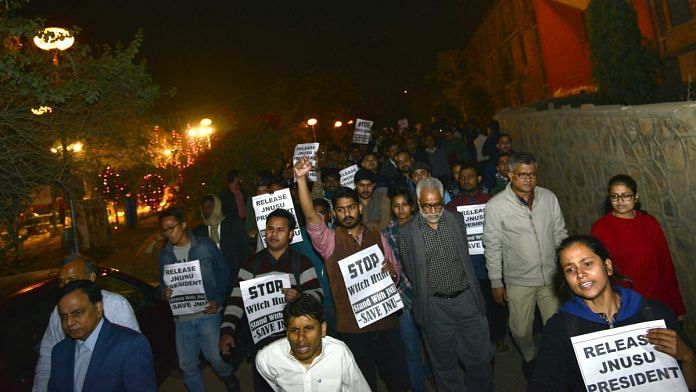University Grants Commission says all educational institutions taking funds from the Central govt will now come under rules that disallow protest.
New Delhi: Teachers employed at central universities could find themselves in trouble if they participate in any anti-government protest or speak at an event critical of the government’s policy and functioning.
This is because the Central Civil Services (Conduct) Rules, which apply to other ‘civilian employees’, will now apply to university teachers as well.
The rules say a government of India employee is not allowed to express his/her views on a platform that is critical of the government or participate in any protest.
This was conveyed to all central universities by the University Grants Commission (UGC) in a letter it sent in May. Universities are still in the process of adopting this rule.
Also read: Delhi University procured EVMs after we gave no objection, says Election Commission
The UGC said all education institutions taking funds from the Central government will have to adopt the rules.
The letter, a copy of which is with ThePrint, asked universities to “adopt government of India/UGC rules for various administrative, financial, establishment and service matters till framing of relevant statutes, ordinances and regulations of the university”.
As per the rules, the government has the right to dismiss an employee if he/she is found breaking the rules.
The restrictions, as per the Department of Personnel of Training (DoPT), include “not making joint representations in matters of common interest”, “not joining any association or demonstration whose objects or activities are prejudicial to the interest of the sovereignty and integrity of India, public order and morality”, “not joining or supporting any illegal strike”.
JNU toes the line
Delhi’s Jawaharlal Nehru University adopted the rule in its latest academic council meeting, amid opposition from a section of its teachers. This means that JNU teachers will not be able to say anything against the government or its functioning, or be able to voice their opinion in public.
“JNU is a public funded university and it is important that in all administrative, financial, establishment and service matters, the university follows the government of India and UGC rules,” said Heeraman Tiwari, acting registrar of JNU.
“It is extremely disappointing that a small section of the JNU Teachers’ Association are deliberately campaigning against UGC regulations.”
The academic council of Delhi University has not taken up the matter for discussion yet. DU has an active teachers’ association that keeps holding protests and raising its voice against the government.
Teachers at other central universities such as Aligarh Muslim University, Banaras Hindu University and Hyderabad Central University usually refrain from being a part of protests. However, they will also now be officially forbidden from doing so.
Teachers up in arms
The diktat has not gone down well with teachers.
A JNU professor, who did not wish to be identified due to the new rules, said: “There is a difference in the way teachers work and government employees work. We cannot be governed under the same rules as them, it will take away our academic freedom, the freedom to express ourselves.”
Also read: Delhi University braces for chaos ahead of Supreme Court ruling on UGC quota order
Rajesh Jha, who teaches at Delhi University, agreed: “We are working for the Central government but we cannot be treated the same way as other Central government employees. We should be given the freedom to voice our opinion, express ourselves, and be critical of the government. In an academic space, all this is also a part of learning.”




Such type of orders shows that the dictatorship of govt. and it is aginst the freedom of expression. shame shame shame…
Universities are the places where young minds are taught PRESENTLY AVAILABLE knowledge, and are also taught TO THINK, so they can contribute to that pool of knowledge. “To think” has to become a habit for them. This type of rules, that you cannot question the government of the day is tantamount to asserting that the government of the day is the best. That means there is no scope for a better state of the society? Isn’t that a foolish thing to say to people who on the other hand are being encouraged TO CONTRIBUTE TO BETTERMENT OF SOCIETY?
Making such a rule compulsory for government offices is essential, because if they start questioning the government then it will lead to anarchy and chaos.